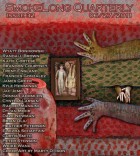One time in college I didn’t have anywhere to go for Thanksgiving, so a friend of mine invited me to her parents’ house. When I got there I found that her entire room was festooned floor to ceiling with elephants. There were elephant posters and stuffed elephants, elephant statues and books about elephants. I’d never known that she was an elephant person and suddenly, there it was. Are you secretly an elephant person? Or is this story an aberration? Or, to put it another way, where on earth did this story come from?
That’s sad that you didn’t have anywhere to go for Thanksgiving. I have the opposite problem. My parents always want me to come home for every holiday, and I long ago ran out of good excuses not to go. Now I just say, “I’m too busy.” They’ll accept that because I come from a hard-core Protestant work ethic family. My story about elephants has something to do with watching news coverage of one of the several wars the United States is conducting in desert places. I think I saw a picture of a tank buried up to its turret in sand and it reminded me of an elephant. It’s fair to call it an aberration because it was not something I had planned on writing. I have no special interest in elephants.
You are a very busy man! Cursory googling (nothing too scary I promise) reveals you to be a screenwriter, novelist, musician, and short story writer… possibly other things…. Could you talk a little bit about your approach to different projects? I guess what I mean is, when you set out to do something, do you know ahead of time what form it will take? Do you start out saying “okay, let’s write a song,” for instance, or is it more of a nebulous urge which then finds suitable form? Or is it something else? (Also, do you talk to yourself in plural form, or am I alone in that?)
Usually with movies I’m asked to write a specific thing so there’s little choice involved. But in general I work out the form and structure of what I’m going to write before I write it, in great detail, in my brain. For a novel I write the ending first, then the beginning, then I work on whatever section in between that I want, because I already know where it fits in the book. A story like “Elephants” is little more than an expanded image. Sometimes those will come into my head independent of my intention and I write them down hoping they will lead somewhere. This one didn’t go any further than what I wrote, and that’s fine. I live alone, so I do talk to myself a lot. Usually in the third person, though. “Good job, idiot! Now there’s pickle juice all over the kitchen floor!”
The stories of yours that I have read and heard evince a great interest in history. This sets them apart from most short fiction I’ve read, at least on the internet, where writing seems much more personal, slice-of-life. Did you study history? Do you draw from it purposely, or does it just naturally come out? (I picture you sitting in your house with a pipe, surrounded by vellum and papyrus…)
I’ve never studied history systematically but I’ve always been interested in the subject. The first books I remember reading were biographies of historical figures. When I was maybe six or seven years old my mom would take me to the library and I would check out as many books as I could physically carry (at that age, not many). I went to a public high school that was lucky enough to have one teacher who could teach Latin. He smoked a pipe that smelled like cherry wood. I was his only student, so we were able to cram six years of Latin into two years. Learning Latin is difficult but extremely rewarding. If you know Latin, when you come across a word like “uxorial,” for instance, you know immediately what it means, because “uxor” is the Latin word for “wife.”
What’s France like? I’ve never been there. Actually, I’ve never been anywhere. Except one time to Sydney, Australia, which seems to be mainly populated by fruit bats.
The thing I like best about Australia, possibly, is that their “paper” money is made out of plastic. You can’t tear it no matter how hard you try. I was in Sydney once for New Year’s Eve, which you probably know is like their July 4th, because in Australia January is summer and July is winter. Everything is topsy-turvy. I was staying on an upper floor of a tall hotel not five hundred meters from another tall building where at midnight they set off fireworks for twenty minutes or so. That was really beautiful. Coincidentally I am working with a director who lives in Sydney and not long ago we had a meeting via Skype. I’ve never done that before. It was really weird. The whole time, I kept thinking “you’re in Sydney, Australia, it’s 8:30 in the morning tomorrow where you are, and it’s 3:30 in the afternoon yesterday where I am.” The meeting was not productive, because I wasn’t really listening. I was trying to decide whether this qualified as time travel or not. France has really great roads. The highways are smooth, and the back roads are well-maintained. Also, something like 80% of their electricity comes from nuclear power. Paris is the most beautiful city I’ve ever seen.
What do you think will happen to this interview? Do you think anyone will read it? Do you think it’ll still be around in ten years, or twenty, or fifty, or a hundred? Do you ever think about the future of the internet? Does all this stuff stay around forever? Will there someday be an Archeology of the Internet? Or will it all just go up in smoke?
When I was writing for Spin in the pre-internet era, I assumed that everything I wrote would be forgotten the minute it was printed, if not sooner. About a year ago a friend of mine told me that every back issue had been scanned and put on Google Books. All my juvenilia on public display. Searchable, even. However: unless someone really conscientious is in charge, every written thing pinging around the internet will eventually decay unless backed up and duplicated (in triplicate) on an ongoing basis. The nature of magnetic media is that it decays. CDs have a much shorter shelf-life than vinyl. MP3s are even shorter-lived than CDs. Hard-drives crash and servers fail. My perfervid hope is that everything on the internet will disappear bit by byte, pressed flat by calamitous gravity, shriveling in the data basement. More likely: when Skynet takes over, it will probably keep everything I’ve ever written as a lesson for whatever humans still survive. “This is how stupid you were! You don’t deserve to live!” For me, impermanence is one of the few charms of mortality.



 The SmokeLong Grand Micro Contest (The Mikey) is now an annual competition celebrating and compensating the best micro fiction and nonfiction online.
The SmokeLong Grand Micro Contest (The Mikey) is now an annual competition celebrating and compensating the best micro fiction and nonfiction online.